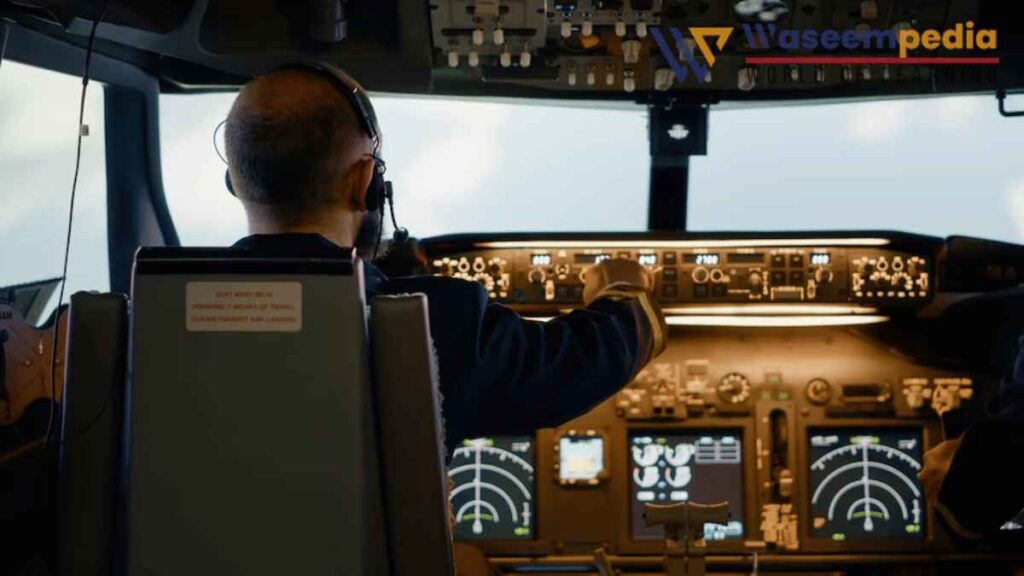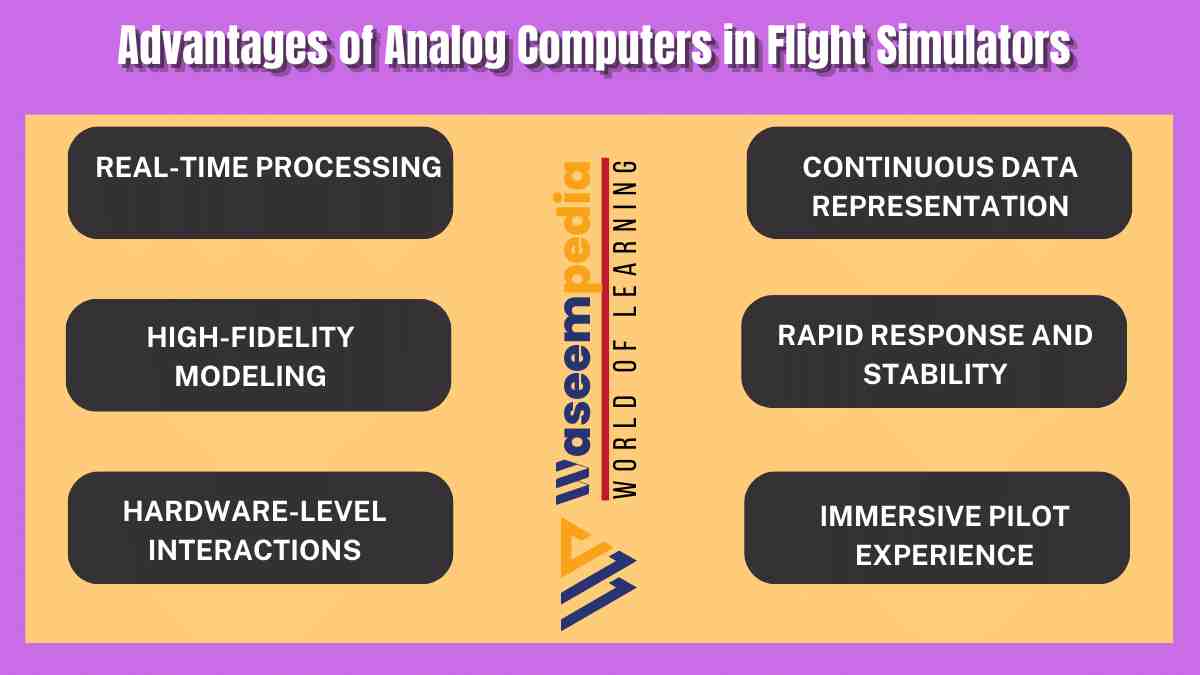Analog computers offer significant advantages in flight simulators, including real-time processing, continuous data representation, high-fidelity modeling, rapid response and stability, hardware-level interactions, and an immersive pilot experience.
While digital computers form the foundation of modern flight simulators, analog computers continue to provide valuable tools for accurately representing flight dynamics and enhancing the realism of the simulated flight experience. The combination of analog and digital approaches in flight simulators contributes to effective pilot training, research, and development in the aviation industry.

Flight simulators play a crucial role in aviation training, research, and development. They provide a realistic virtual environment for pilots to practice and improve their skills, and for researchers to study aircraft behavior and test new technologies. .
While digital computers are commonly used in flight simulators, analog computers offer unique advantages that make them valuable tools in this field. In this article, we will explore the advantages of analog computers in flight simulators and understand their significance in simulating the complexities of flight.
Flight simulators are sophisticated training tools that replicate the experience of flying an aircraft. They provide pilots with a realistic environment to practice various flight scenarios, including takeoff, landing, and emergency procedures.
Flight simulators also allow researchers to study aircraft behavior, evaluate new technologies, and improve flight safety. While digital computers are the backbone of modern flight simulators, analog computers offer unique advantages in simulating flight dynamics and enhancing the overall experience.
What is Analog Computers?
Analog computers process information using continuous physical quantities, such as voltages or currents, to represent and manipulate data. Unlike digital computers that operate on discrete values, analog computers can directly model and simulate the behavior of complex systems. In the context of flight simulators, analog computers offer an alternative approach to understanding and representing the dynamics of flight.
6 Advantages of Analog Computers in Flight Simulators
6 Advantages of Analog Computers in Flight Simulators are as given blew:
1. Real-Time Processing
Real-time processing is critical in flight simulators, as it enables immediate response to pilot inputs and dynamic changes in the simulated environment. Analog computers excel in real-time processing due to their ability to work with continuous data streams without the need for digitization or discretization.
This real-time capability allows flight simulators to accurately simulate and respond to pilot actions and environmental conditions in real-time, providing a highly realistic and immersive experience.
2. Continuous Data Representation
Analog computers utilize continuous data representation, which is advantageous in flight simulators. Flight dynamics involve continuous changes in variables such as altitude, speed, and control inputs. Analog computers can process and represent this continuous data without the loss of information associated with discretization.
By working with continuous data, analog computers can provide a more accurate representation of the flight dynamics, allowing pilots and researchers to analyze and understand the behavior of the aircraft in greater detail.
3. High-Fidelity Modeling
Analog computers excel in high-fidelity modeling of flight dynamics. By directly simulating the continuous behavior of flight variables, analog computers can accurately capture the complex dynamics of aircraft motion.
This high-fidelity modeling enables flight simulators to replicate the behavior of various aircraft types and simulate realistic flight scenarios. Pilots can practice maneuvers, evaluate aircraft performance, and experience the nuances of different flight conditions.
4. Rapid Response and Stability
Analog computers offer rapid response and stability in flight simulators. The continuous nature of analog computation allows for real-time calculation and adjustment of flight variables.
Analog computers can process complex flight equations and control algorithms in real-time, enabling immediate response to pilot inputs and dynamic changes in the simulated environment. This rapid response and stability enhance the realism and accuracy of the simulated flight experience.
5. Hardware-Level Interactions
Analog computers enable hardware-level interactions in flight simulators. They can interface directly with physical control devices, such as yokes, pedals, and throttles, allowing for real-time control and feedback.

This hardware-level interaction enhances the realism and responsiveness of the flight simulator, as pilots can manipulate physical controls and receive immediate tactile feedback, simulating the feel of flying an actual aircraft.
6. Immersive Pilot Experience
Analog computers contribute to an immersive pilot experience in flight simulators. The accurate modeling of flight dynamics, real-time processing, and hardware-level interactions create a realistic and engaging environment for pilots.
Analog computers can replicate the sensations of flight, such as G-forces, turbulence, and control feedback, enhancing the training and learning experience for pilots.
Related FAQ’s
How do analog computers contribute to high-fidelity modeling in flight simulators?
Analog computers can capture the complex dynamics of aircraft motion by directly simulating the continuous behavior of flight variables, allowing for accurate representation of flight dynamics in the simulator.
How do analog computers enhance the immersive pilot experience in flight simulators?
Analog computers accurately model flight dynamics, enable hardware-level interactions with physical controls, and replicate sensations of flight, creating a realistic and engaging environment for pilots.
Why is real-time processing important in flight simulators?
Real-time processing allows flight simulators to respond immediately to pilot inputs and dynamic changes in the simulated environment, enhancing the realism of the simulated flight experience.
What advantages do analog computers offer in flight simulators?
Analog computers excel in real-time processing, continuous data representation, high-fidelity modeling, rapid response and stability, hardware-level interactions, and an immersive pilot experience.
How do analog computers differ from digital computers in flight simulators?
Analog computers process continuous data and directly model flight dynamics, while digital computers operate on discrete values and rely on algorithms for simulation.

